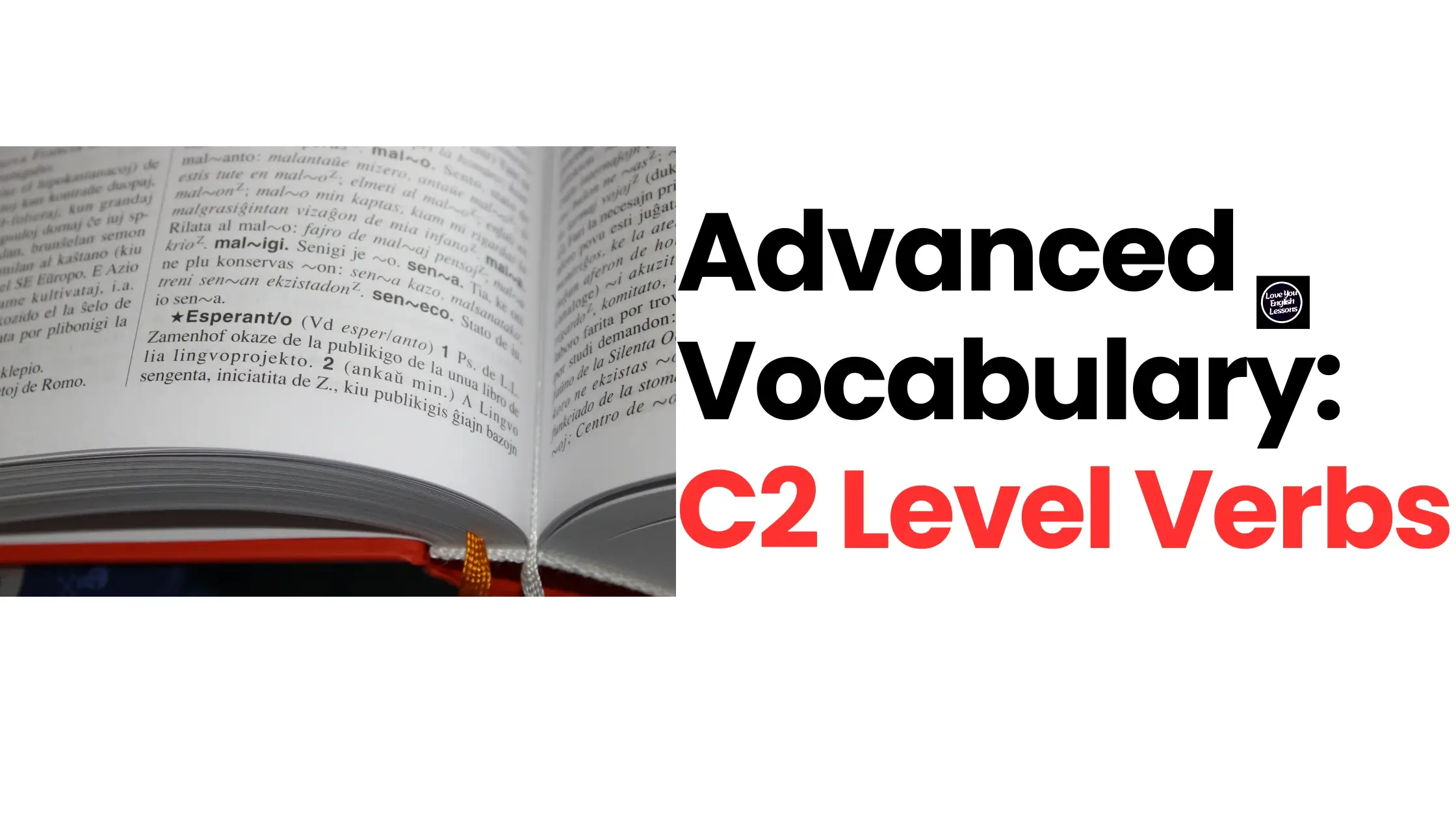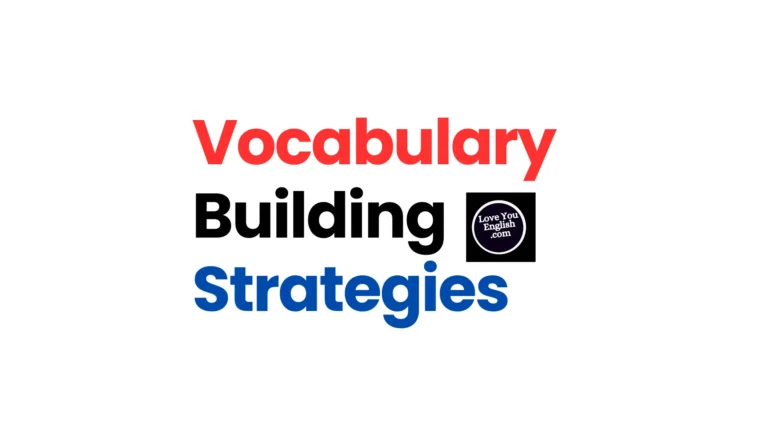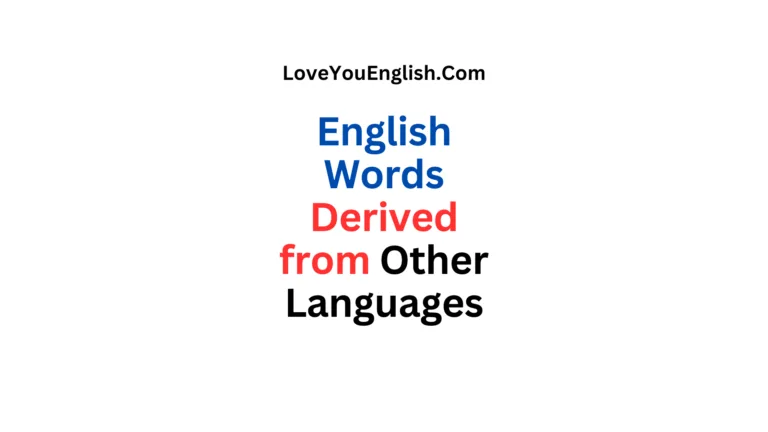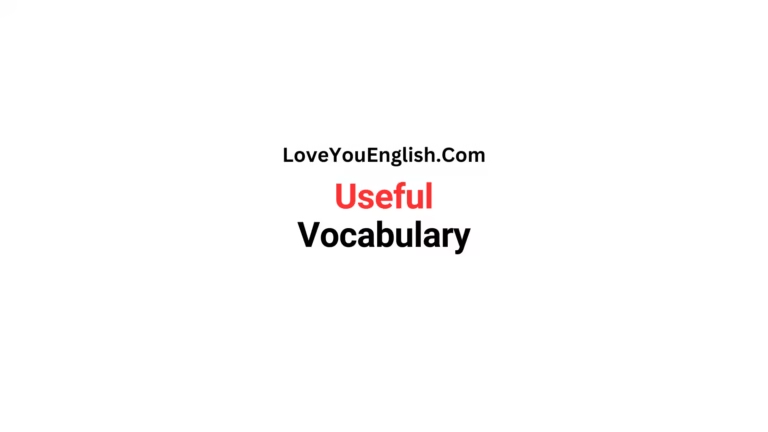Advanced C2 Vocabulary: Improve English Skills
Reaching the C2 level means you are close to native-like fluency in English. At this stage, basic and even advanced words are not enough—you need precise, sophisticated, and nuanced vocabulary to express complex ideas clearly and confidently.
This guide on Advanced C2 Vocabulary is designed to help you refine your English skills for academic writing, professional communication, debates, presentations, and high-level exams such as IELTS, CPE, or university-level studies. C2 vocabulary allows you to sound polished, articulate, and intellectually confident.
This topic will help you:
-
Express abstract and complex ideas accurately
-
Improve academic and formal writing
-
Speak with clarity, depth, and precision
-
Understand high-level texts, articles, and discussions
-
Sound more natural and fluent in professional settings
Learning C2-level vocabulary is not about memorising difficult words—it’s about using the right word in the right context. With regular practice, these words will help you communicate ideas with subtlety, confidence, and authority.
Why Learn C2-Level Verbs?
At the C2 level, you are expected to:
- Express complex ideas with precision.
- Understand subtle differences in meaning.
- Adapt your language to different contexts, such as academic, professional, or casual settings.
C2-level verbs are particularly important because they help you replace simpler verbs like “do,” “make,” or “get” with more specific words that convey exact meanings.
50 C2-Level Verbs to Boost Your Vocabulary
1–10: Verbs for Precision
These verbs allow you to describe actions or processes with greater accuracy.
- Absolve – To declare someone free from blame or responsibility.
The judge absolved the defendant of all charges. - Bolster – To support or strengthen.
She used data to bolster her argument. - Circumvent – To find a way around an obstacle or rule.
They circumvented the problem by proposing an alternative solution. - Dispel – To drive away doubts, fears, or misconceptions.
The speaker dispelled the audience’s concerns with clear explanations. - Engender – To cause or give rise to something.
The policy changes engendered public outrage. - Exacerbate – To make a situation worse.
The heavy rains exacerbated the flooding. - Galvanize – To motivate or inspire someone to take action.
The leader’s speech galvanized the team into action. - Impart – To pass on knowledge or information.
The teacher imparted valuable skills to her students. - Mitigate – To reduce the severity of something.
New safety measures were introduced to mitigate risks. - Repudiate – To reject or refuse to accept.
He repudiated the accusations as false.
11–20: Verbs for Emotions and Relationships
Use these verbs to describe emotional states or interpersonal dynamics.
- Alienate – To make someone feel isolated or unwelcome.
His harsh words alienated his colleagues. - Appease – To calm or pacify someone, often by meeting their demands.
The company took steps to appease dissatisfied customers. - Coerce – To force someone to do something against their will.
The confession was obtained through coercion. - Exonerate – To officially declare someone not guilty.
The new evidence exonerated the suspect. - Foster – To encourage the growth or development of something.
The program fosters creativity in young minds. - Placate – To soothe someone’s anger or anxiety.
She tried to placate the angry customer with a refund. - Reconcile – To restore friendly relations between people.
They reconciled after years of conflict. - Scorn – To express contempt or disdain.
She scorned his suggestion as impractical. - Undermine – To weaken or damage something, often secretly.
The scandal undermined his credibility. - Vindicate – To clear someone’s name or prove their actions right.
The report vindicated her decision to act swiftly.
21–30: Verbs for Intellectual and Analytical Skills
These verbs are useful in academic and professional contexts.
- Advocate – To support or argue for a cause or policy.
She advocates for environmental sustainability. - Analyze – To examine something in detail for better understanding.
The data was analyzed to identify trends. - Consolidate – To strengthen or combine resources.
The company consolidated its position in the market. - Critique – To evaluate something critically.
The article critiqued the government’s response to the crisis. - Decipher – To interpret or make sense of something difficult.
Experts worked to decipher the ancient script. - Elicit – To draw out a response or reaction.
The teacher’s question elicited a lively discussion. - Expound – To explain or elaborate on a topic.
She expounded on her theory during the lecture. - Hypothesize – To propose an explanation based on evidence.
Scientists hypothesize that climate change is accelerating. - Postulate – To assume or suggest as a basis for reasoning.
The theory postulates that all matter is made of atoms. - Substantiate – To provide evidence to support a claim.
They could not substantiate the allegations.
31–40: Verbs for Change and Transformation
These verbs describe how things develop, shift, or transform.
- Augment – To increase or enhance something.
The company augmented its profits by diversifying its products. - Delineate – To describe or outline something in detail.
The report delineates the steps required to complete the project. - Deviate – To stray from an established path or norm.
The conversation deviated from the main topic. - Eradicate – To completely eliminate something.
Efforts to eradicate the disease have been successful. - Fluctuate – To change or vary irregularly.
The stock prices fluctuated throughout the day. - Innovate – To introduce new ideas or methods.
The company is known for its ability to innovate. - Optimize – To make the best or most effective use of something.
The software was optimized for faster performance. - Overhaul – To completely renovate or revise something.
The company overhauled its outdated policies. - Revamp – To improve or modernize something.
The website was revamped to enhance user experience. - Transform – To change something significantly.
The project transformed the community.
41–50: Verbs for Communication and Influence
Use these verbs to describe interactions and influence effectively.
- Assert – To state something confidently.
She asserted her right to be heard. - Convey – To communicate a message or idea.
The painting conveys a sense of serenity. - Dictate – To determine or strongly influence something.
Circumstances dictated the course of action. - Exemplify – To serve as an example of something.
Her success exemplifies hard work and determination. - Persuade – To convince someone to do or believe something.
He persuaded his friends to join the cause. - Propagate – To spread or promote an idea widely.
The organization propagates awareness about mental health. - Reiterate – To repeat something for emphasis or clarity.
The teacher reiterated the key points of the lesson. - Stipulate – To specify a condition in an agreement.
The contract stipulates that payments must be made on time. - Suppress – To prevent the expression or spread of something.
The government suppressed the protest. - Validate – To confirm or prove something as true.
The findings were validated by further research.
How to Practice and Use C2-Level Verbs
- Read Widely: Exposure to advanced verbs in context helps you understand their meanings and usage. Read books, articles, and essays written for advanced learners or native speakers.
- Use a Thesaurus: When writing or speaking, replace simpler verbs with more advanced ones to practice.
- Create Sentences: Write sentences using the new verbs. Focus on using them in different contexts.
- Engage in Discussions: Participate in debates, discussions, or writing exercises that challenge you to use precise vocabulary.
- Review and Revise: Keep track of new verbs you learn. Review them regularly to ensure they become part of your active vocabulary.
Conclusion
C2-level verbs are essential for expressing yourself clearly and effectively in English.
By incorporating these advanced verbs into your everyday language, you’ll sound more polished and professional.
Remember to practice regularly and stay curious—your vocabulary will continue to grow!
You may also like these English learning articles:
- 30 Phrasal Verbs using “OFF” with Meanings and Sentences
- 30 Phrasal Verbs using “COME” with Meanings and Sentences
- 30 Phrasal Verbs using “DOWN” with Meanings and Sentences
- 30 Phrasal Verbs using “PLAY” with Meanings and Sentences






